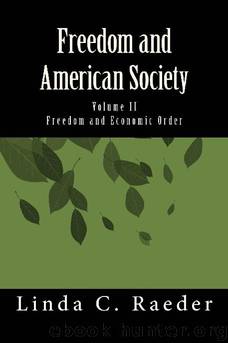Freedom and Economic Order by Linda C Raeder

Author:Linda C Raeder [Raeder, Linda C]
Language: eng
Format: epub
Publisher: Sanctuary Cove Publishing
Published: 2017-04-30T04:00:00+00:00
Nine
__________________________________________________
The Marxist Critique of Capitalism
__________________________________________________
. . . [M]odern bourgeois private property is the final and most complete expression of the system of producing and appropriating products, that is based on class antagonisms, on the exploitation of the many by the few. ―Karl Marx
The theory of Communists may be summed up in the single sentence: Abolition of private property ―Karl Marx
Previous chapters examined the essential differences between capitalism and socialism principally from an economic point of view. Both theory and historical experience clearly demonstrate the superiority of the market process with respect to both the allocation of scarce resources and fulfillment of subjective human values. The free-enterprise system has resulted in the greatest and most far-reaching prosperity ever achieved in human history, while the experiment in economic centralization, wherever implemented, has universally failed to produce the results anticipated by its advocates. The disparity in performance is not accidental but rather stems from the nature of things—from the fundamental fact of scarcity and the fact that no human being or select group of human beings can know more than an infinitesimal fraction of all the relevant facts that must be taken into account in solving the economic problem that arises from scarcity. Planners in a centralized economy have no means of accessing the knowledge and information that daily and spontaneously informs the market process via the price system secured by the rule of law. Both reason and experience, theory and history, conclusively establish the inherent superiority of the market solution to the economic problem that confronts every human society.
Neither the demonstrations of reason nor the evidence of history, however, have led to the abandonment of socialist aspirations. It is true that pure communism—total government ownership of the means of production and other resources—has been rejected in all but a few nations, such as North Korea. But to the astonishment of those familiar with the catastrophic history of the twentieth century—the Age of Totalitarianism—significant portions of the contemporary American electorate, as well as their political leaders, seem oblivious to such experience. A growing number of Americans, like the millions who pursued a similar dream in the previous century, seem enchanted by the siren song of socialism. In recent years the United States has adopted policy after policy—health-insurance legislation; nationalization of student loans; governmental direction of private industries and financial institutions; so-called “economic stimulus” plans; massive regulatory and other interventionist policies—more typical of a socialized than a free economy. Indeed in 2016 a self-avowed Socialist achieved considerable success in presidential primary elections.[46]
One would expect heirs of the twentieth century to know better, having gained knowledge and experience unavailable to the initial champions of economic socialization. The results of the collectivist experiment—economic collapse, immiseration of the populace, and tragic destruction of both human life and human values—are not mere theoretical possibilities but documented historical fact. Indeed, the twentieth century was among the most barbaric in human history, if wanton destruction of human life is regarded as barbaric. By conservative estimates, more than one hundred million
Download
This site does not store any files on its server. We only index and link to content provided by other sites. Please contact the content providers to delete copyright contents if any and email us, we'll remove relevant links or contents immediately.
The Secret History by Donna Tartt(16662)
The Social Justice Warrior Handbook by Lisa De Pasquale(11494)
Thirteen Reasons Why by Jay Asher(7802)
This Is How You Lose Her by Junot Diaz(5799)
Weapons of Math Destruction by Cathy O'Neil(5046)
Zero to One by Peter Thiel(4835)
The Myth of the Strong Leader by Archie Brown(4796)
Promise Me, Dad by Joe Biden(4456)
Beartown by Fredrik Backman(4434)
Stone's Rules by Roger Stone(4423)
How Democracies Die by Steven Levitsky & Daniel Ziblatt(4414)
The Fire Next Time by James Baldwin(4351)
100 Deadly Skills by Clint Emerson(4086)
A Higher Loyalty: Truth, Lies, and Leadership by James Comey(4040)
Rise and Kill First by Ronen Bergman(4021)
The David Icke Guide to the Global Conspiracy (and how to end it) by David Icke(3891)
The Farm by Tom Rob Smith(3878)
Secrecy World by Jake Bernstein(3788)
The Doomsday Machine by Daniel Ellsberg(3737)
